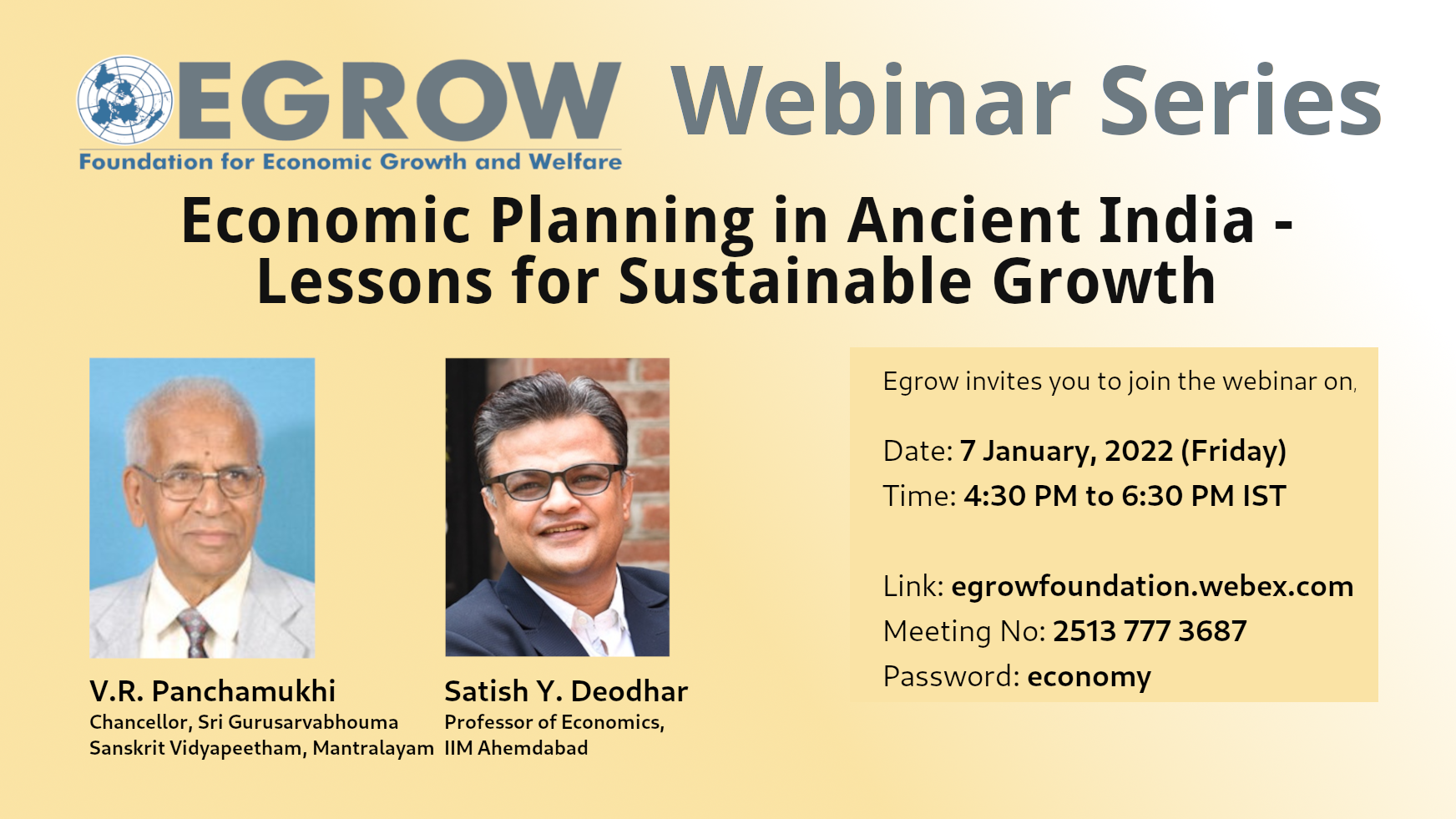Economic Planning in Ancient India - Lessons for Sustainable Growth

Webinar Link
Meeting No: 2513 777 3687
password: economy
Abstract
Ancient Indian thinkers had understood that a person's life goes through different stages and one's life pursuits vary with life stages and volition, and they may be conditioned by one's occupation. This mature thinking was quite refined than a simple dichotomous choice of baser pursuits or spiritual pursuits.
However, Standard economics literature of modern times. assumes that a household would like to maximize the objective-utility, satisfaction or welfare-that would be a function of material goods and services consumed, given the budget constraint. It also assumes that the preferences of the household are stable and consistent. In this context, ancient Indian thinkers seem to have considered not a unidimensional but a four-faceted life objective, which can be attained dynamically over four different stages of life. The preferences may change as one progresses in life stages. And, of course, they may be conditioned by the occupation one is in. The choice of proportions between different life objectives would be that of an individual household.
On this background the discussion tries to critically illustrate the difference between the two school of thoughts ancient Indian Philosophy and modern consumerism.
About the Speakers
V. R. Panchamukhi
Prof V. R. Panchamukhi is an Indian Economist and Sanskrit scholar. He had done pioneering work on the applications of game theory to International Trade Policy analysis that made significant impact on the trade policy regimes of the 1960s and 1970s. He also worked on development models and resource gaps for the countries in ECAFE (now ESCAP) with Nobel Laureate Tinbergen which became the basis for Resource Transfer for Development in the ESCAP region in the 1970s. He was invited to work at the South Centre (organization), Geneva, by Julius Nyerere, the former President of Tanzania, and the then Chairman of the group. His analytical paper on the proposed Multilateral Agreement on Investment was utilized for negotiations at the WTO Ministerial Meetings (Singapore) in the 1990s.
He has held several academic position viz Lecturer, Department of Statistics, Bombay University, Senior Research Officer/Reader in Econometrics, Department of Economics, Bombay University Research Professor, Centre for Policy Research, New Delhi, Professor of Economics, Institute of Economic Growth, Delhi University
He has also been in various executive position viz Economic Advisor, Ministry of Finance (India), Chairman, Indian Council of Social Science Research (ICSSR), Managing Editor, Indian Economic Journal, Indian Economic Association Managing Trustee, Indian Economic Association Trust for Research and Development, Vice-Chairman, Indian Economic Association Trust for Research and Development, Vice President, Sukhamoy Chakravarty Memorial Trust
He is the Founder Director General, Research and Information System for Developing Countries, an autonomous body established by the Ministry of External Affairs (India) into an important 'think tank' of the developing world. It provided analytical inputs on international economic topics such as WTO, regional cooperation, investment flows and many others.
He was a Gold medallist in Econometrics from University of Bombay and completed his Ph.D. from Delhi School of Economics.
Satish Y. Deodhar
Prof. Deodhar teaches economics at the Indian Institute of Management Ahmedabad. He completed his bachelor’s and master’s in economics from the Gokhale Institute of Politics and Economics, Pune, and received Ph.D. in Agricultural Economics from The Ohio State University.
He has worked on imperfectly competitive market structures, World Trade Organization (WTO), agricultural trade, food quality, and CSR issues. He has conducted research projects for India’s Ministry of Food Processing Industry, Ministry of Agriculture, Indian Bank, and Economic Research Service of the US Department of Agriculture. He was selected as the Hewlett Fellow of the International Agricultural Trade Research Consortium during 2006-2008. Prof. Deodhar was the recipient of the Outstanding Ph.D. Dissertation Award from the US Food Distribution Research Society, and has been honoured with the Dewang Mehta Best Professor of Economics Award in 2012 and 2015 by the Business School Affaire. He has also been the recipient of the Distinguished Young Professor Award for Excellence in Research from IIMA.
He has authored quite a few monographs and books. One of his books, Day to Day Economics, which he wrote for the IIMA Random House Business Book Series, has gone on to become a national bestseller in non-fiction category with more than 60,000 copies sold till date. Prof. Deodhar was the pioneer Convener of the largest annual computerized common admission test (CAT) conducted by IIMs for admissions to management schools.
He has held many administrative positions at IIMA including Admission Chair, PGP Chair, Placement Chair, PGPX Chair, Welfare Chair, and Warden. He is a Life Member of the Association of Food Scientists and Technologists (India), and serves on the advisory board of Savida Agri-com Ltd. He was on the board of Asian Granito Ltd., as an independent director. He was also instrumental in bringing out the commemorative postal stamp by India’s Department of Post in memory of the 18th century Indian statesman, Bajirao Peshwa I.